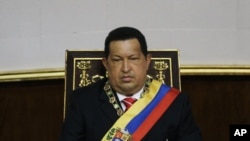Venezuelans and their political leaders are facing a week of questions as the country, and the world, waits to see if ailing President Hugo Chavez takes the oath of office January 10.
Thursday is the day designated by the Venezuelan constitution for administering the oath of office. Chavez won re-election in October, but he has been in Cuba for cancer treatment and has not been seen in public for nearly a month.
The most recent word on Chavez's condition came this past Thursday from Venezuela Information Minister Ernesto Villegas, who said the president has experienced some difficulties.
"Following the sensitive surgery on 11 December, Commander Chavez has faced some complications as a consequence of a severe lung infection," he said. "This infection has resulted in a respiratory deficiency that requires Commander Chavez to remain in strict compliance with his medical treatment. The government of the Bolivarian Republic of Venezuela reiterates their confidence in the medical team taking care of the president which has been following closely the evolution of the patient and has acted with the utmost thoroughness in dealing with the difficulties that have come about."
Doctors have been treating Chavez for cancer in his pelvic area, but his exact form of cancer and condition are unknown.
Some Venezuelan opposition leaders argue if Chavez is unable to take the oath of office on January 10, it would have to mean he is stepping down and that new elections would have to be held.
Chavez's allies, including re-elected National Assembly Speaker Diosdado Cabello, say that is not the case.
"Without any arrogance [I can tell you], on 10 January, it does not mean anything if President Chavez is not present [for the inauguration], President Chavez was elected on 7 October for the term between 2013 and 2019," he said.
Vice President Nicolas Maduro has said if Chavez is unable to attend his inauguration Thursday before the National Assembly, he could be sworn in later by the Supreme Court.
On Saturday, while speaking to supporters, he blamed much of the uncertainty on propaganda by the opposition.
"We need to be in constant battle to fight the lies," he said. "If the lies come via Twitter, then let us go after the lies on Twitter, if the lies come via Facebook, then let us go after the lies on Facebook. If they are in the street, then let us argue against them in the street."
Maduro also promised more information would be coming.
"In the coming days, we will continue to inform you about the status of the respiratory condition that our commander [Chavez] is suffering. You know that these types of treatments call for keeping calm and we are calm. We are calm," he said.
Some legal experts note the constitution allows the Supreme Court to swear in the president without mentioning a specific date.
For now, all that is certain is that. Chavez's allies hold a majority in the Assembly and all of its leadership positions.
Thursday is the day designated by the Venezuelan constitution for administering the oath of office. Chavez won re-election in October, but he has been in Cuba for cancer treatment and has not been seen in public for nearly a month.
The most recent word on Chavez's condition came this past Thursday from Venezuela Information Minister Ernesto Villegas, who said the president has experienced some difficulties.
"Following the sensitive surgery on 11 December, Commander Chavez has faced some complications as a consequence of a severe lung infection," he said. "This infection has resulted in a respiratory deficiency that requires Commander Chavez to remain in strict compliance with his medical treatment. The government of the Bolivarian Republic of Venezuela reiterates their confidence in the medical team taking care of the president which has been following closely the evolution of the patient and has acted with the utmost thoroughness in dealing with the difficulties that have come about."
Doctors have been treating Chavez for cancer in his pelvic area, but his exact form of cancer and condition are unknown.
Some Venezuelan opposition leaders argue if Chavez is unable to take the oath of office on January 10, it would have to mean he is stepping down and that new elections would have to be held.
Chavez's allies, including re-elected National Assembly Speaker Diosdado Cabello, say that is not the case.
"Without any arrogance [I can tell you], on 10 January, it does not mean anything if President Chavez is not present [for the inauguration], President Chavez was elected on 7 October for the term between 2013 and 2019," he said.
Vice President Nicolas Maduro has said if Chavez is unable to attend his inauguration Thursday before the National Assembly, he could be sworn in later by the Supreme Court.
On Saturday, while speaking to supporters, he blamed much of the uncertainty on propaganda by the opposition.
"We need to be in constant battle to fight the lies," he said. "If the lies come via Twitter, then let us go after the lies on Twitter, if the lies come via Facebook, then let us go after the lies on Facebook. If they are in the street, then let us argue against them in the street."
Maduro also promised more information would be coming.
"In the coming days, we will continue to inform you about the status of the respiratory condition that our commander [Chavez] is suffering. You know that these types of treatments call for keeping calm and we are calm. We are calm," he said.
Some legal experts note the constitution allows the Supreme Court to swear in the president without mentioning a specific date.
For now, all that is certain is that. Chavez's allies hold a majority in the Assembly and all of its leadership positions.











